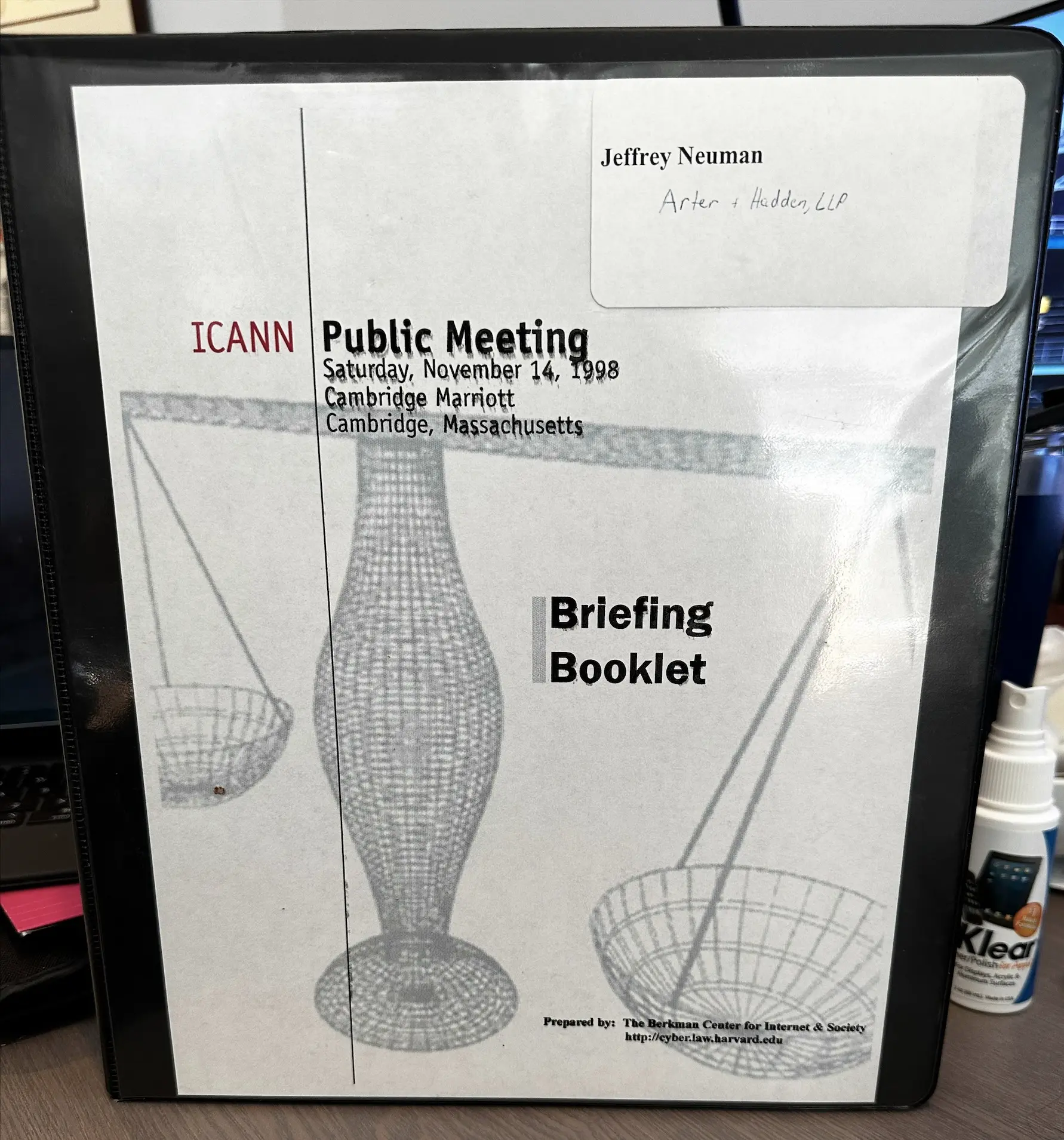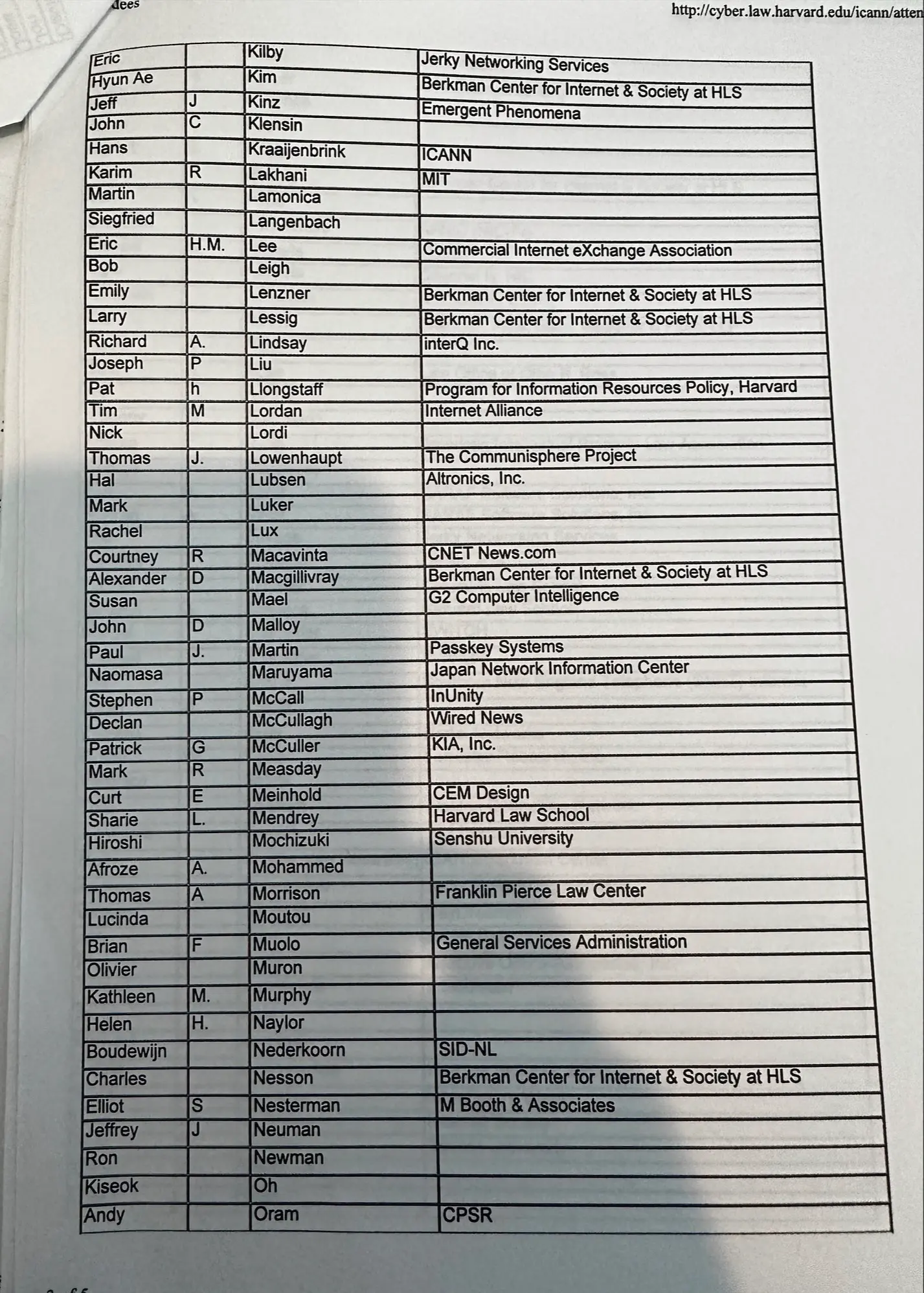


|
||
|
||
As ICANN turns 25 and I turn 51, I realize that I have literally spent more than ½ of my life working in the domain name industry and with the first multistakeholder experiment originally called NewCo (later called the Internet Corporation for Assigned Names and Numbers (“ICANN”).
My first interaction with NewCo, after the Green Paper, White Paper, Internet Forum for the White Paper, etc., was an Intellectual Property attorney at the law firm of Arter & Hadden. I was also on the Cyberspace committee of the American Intellectual Property Law Association (AIPLA), which would go on to become one of the original members of the Intellectual Property Constituency of ICANN.
At the time, I was there solely to represent my clients in the hopes of developing a faster, cheaper and more efficient dispute resolution mechanism to combat the then-growing problem, which was later called cybersquatting. For those that were around back then, there were several well-known serial cybersquatters (e.g., John Zuccarini, William Purdy, Dennis Toeppen) that registered many of the well-known brands and were holding those names hostage trying to extort legitimate companies and organizations. The commercialization of domain names was still relatively new, the law was not yet developed, and the dispute policy at Network Solutions (the sole registry and registrar) was painful, slow, difficult to navigate, and wholly insufficient.

On November 13, 1998, I took an Amtrak from Washington D.C to Boston, Massachusetts, to attend the very first ICANN Public Meeting at the Cambridge Marriott. My parents lived just outside Boston, so I used it as an excuse to go see my parents as well. My law firm was not paying for the trip, so I went on my own dime. On the long 7-8 hour train ride, I brought with me a book named “A Civil Action” and passed the time by reading through most of it during the trip. In the book (but not in the movie of the same name), the protagonist sought the help of a Harvard professor named Charles Nesson to deal with the complex toxic tort case. The author described the man as brilliant, charming and appeared to others as very friendly. He had long flowing greyish/white hair, an incredible smile, and stood out in any room he was in. The book described Mr. Nesson as a person who was always looking to meet the most important person in the room. When he was introduced to someone, he would rarely make eye contact with that person, as he was always looking around the room to meet someone more important. If you were not that person, he would quickly move on.
When I got to Boston, I had a great home-cooked meal with my family and then set out for the Cambridge Marriot, which was hosting the first ICANN meeting on November 14. I approached the registration table, signed in, and was given a name tag and a Sharpie to write my name on the tag, and was handed a binder.
The first speaker was the founder of Harvard’s Berkman Center for Internet & Society, who introduced the meeting’s purpose and agenda. He had long, flowing greyish/whitish hair and introduced himself as Charles Nesson (yes, the same one I was just reading about on the train from “A Civil Action”). After getting over the shock of who that was, and the fact that the book nailed his description, he went on to introduce the 10 people that were sitting at a table in the front of the room on a make-shift stage. He announced them as the first ICANN Board of Directors. He explained that the Directors were hand-selected by Jon Postel (who tragically passed away a few weeks before the meeting) and his counsel, Joe Sims, from the law firm of Jones Day. Their Bios were provided in the binder, and we were told that Esther Dyson was elected Chair of the 9-person board. We were introduced to a 10th person, Michael Roberts, who was the newly appointed CEO. I cannot recall if he was a voting member of the Board at the time or not.

After the introductions, we went straight into a public forum session, and to put it mildly, all hell broke loose. It was like nothing I had ever seen before. Academics and representatives from civil society and business got up to the mic, introduced themselves, and proceeded to complain about the people sitting on the stage. Some of them were actually raising their voices as they spoke.
Why are you all the members of the Board? Who chose you to lead this? What makes you qualified to be OUR Board members? We need to have direct elections! You are not a legitimate Board. We need to start over…
As a 27-year-old new to this, I was shocked that grown men and women would get up to the microphone in front of hundreds of people and just yell at the poor people on the stage. The people on the stage, however, were not as shocked as I was. In fact, to me, they were stoic and resolute. Despite being insulted by many in the audience, they remained calm, cool and collected. They thanked those who got up to the microphone and told them they understood how they felt but that work needed to be done (including figuring out how Board Directors would be selected in the future). Without Jon Postel around and without Joe Sims defending the choices, participants were getting more irate at the responses they were getting. Some actually called for a vote of no confidence in the Board (who had yet to actually do anything). I, too, was getting more frustrated. All of my time was being used up by people questioning the legitimacy of the Board, and the process used to pick them, and we were not getting to the real issue (in my mind) of cybersquatting.
It was at that point that I learned the first of many ICANN lessons.
Next week, I will attend my 70th plus ICANN meeting (though attendance was online during the pandemic). I am considered an old-timer, but I was once new to ICANN like everyone else. I have to keep reminding myself of these lessons, even as an old-timer. There are many more stories to come, but I thought I would share with you this chapter.
P.S. After the meeting, I did go up to Charles Nesson to meet him. I thanked him for hosting the meeting and told him that I was in the midst of reading the book A Civil Action. But just as the book foretold, he never made eye contact with me despite shaking my hand. And I am sure he didn’t really hear anything I said. He was looking around the room for the most important person in the room, who was standing behind me and to the left. I will let you all guess as to who that was.
This post is part of a series presented by CircleID in collaboration with the ICANN community, celebrating ICANN’s 25th anniversary. We’ve partnered with ICANN to amplify this milestone and actively encourage contributions. We warmly welcome you to share your essays for potential publication.
Sponsored byRadix

Sponsored byWhoisXML API

Sponsored byVerisign

Sponsored byVerisign

Sponsored byDNIB.com

Sponsored byIPv4.Global

Sponsored byCSC
